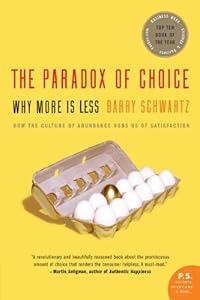I remember the exact moment when Career Paralysis struck. I had just left graduate school orientation – a somber, lackluster affair compared to the grand show of college orientation; this one seemed to announce, “there’s no more fun – the coming years will simply suck” – and sunk onto the hand-me-down couch in my cinder block apartment to sort through the barrage of information. I quickly landed on the Cornell University catalog. I should have stopped right there. Right there. Because I already knew what I was going to study. I was at Cornell to pursue a PhD in developmental psychology. End of story. And yet how could I resist the thick, creaseless, shiny catalog lying in my open hands? It called to me in urgent whisperings. Go on, open me. Glimpse the many paths untaken. You know you want to.
So I did.
I started by flipping to the list of majors in the university’s College of Agriculture and Life Sciences. I’d come from a liberal arts college, where the most exotic major is Art (alright, Women's Studies...), so to say I was blown away by the list before me is an understatement. The majors weren’t just foreign, they included terms I didn’t even know. Entomology? Biometry? Viticulture and Enology?
I stopped breathing then and there. Well, for a few seconds; I’m no world class breath holder or anything. All I could think was, If I don’t know about all of the possible career paths out there, how could I possibly have landed on the right one?
And that was it. Career Paralysis had taken hold, soon followed by Internet Addiction (Subtype: Ceaseless Career Research). Before long, I was a graduate school dropout working a plum job I wasn’t sure I wanted.
I share my sordid story because, alas, I am not alone. There’s no better way to stymy progress and undercut contentment with the choices you make than to consider all of your options. It turns out psychologists have known this for a while. They find that the more choices we have, the less likely we are to make a choice and the more likely we are to be dissatisfied with our eventual choice, should we make one.
The classic study on this so-called paradox of choice was conducted using homemade jam. One day the experimenters set up a table that offered grocery store patrons tastings of six types of jam. On another day, their table offered 24 types of jam to taste. Lo and behold, they sold much more jam when there were fewer varieties available to taste. In fact, only 3% of the people who saw the large jam display bought a jar, compared to 30% of the people exposed to the small jam display. Which may mean that if you follow my advice and consider all of your career options, only 3% of you will end up actively choosing a satisfying career (i.e., failing this class). Now wouldn’t that be something?
Follow-up studies have found that having more choices also makes us less satisfied with our eventual decision. We inevitably come to regret our choice, thinking longingly of all the roads not taken. If only I’d pursued animal husbandry, my life would be lined with gold.
The advice psychologists offer, then, is to limit the choices you consider before making a decision. Don’t look at the array of options out there, look only at the options that are meaningful and feasible for you.
If I’d been honest with myself while lying on my crusty grad school couch, nothing in an agricultural school would ever remotely interest me. I’ve never gotten a houseplant to survive more than two weeks, let alone bred crops and reared animals. In truth, the majority of that expansive Cornell catalog was not in my realm of possibility, due to my interests, skill sets, experiences, and optimal work environments. I should have been considering those first (we’ll talk about how to do this – er, how to avoid doing this – in future lessons).
I’ll tell you, though, conducting unending research on all possible careers is a terrific fake out. Not only can you tell yourself you’re being super-productive – you’re researching careers, after all, isn’t that what you’re supposed to be doing in your twenties?! – but your parents will be pretty darn proud of you, too. All the while, you’ll be decreasing your chances of ever finding a fulfilling career. Triple score!
So the long and short of it is, if you want to avoid choosing your career for as long as possible, and to hate your career once you finally pick it, peruse some university catalogs, breeze through the lists of careers at the Bureau of Labor Statistics, Google the many thousands of graduate degrees you could possibly earn.
And if you have time in amongst all of that, do this week’s assignment. You’ll be too inundated with information, too awash with paralysis, to let Barry Schwartz’s practical advice sway you. Go ahead, read the book. I dare you.
Assignment:
Read The Paradox of Choice: Why Less is More by Barry Schwartz, PhD. (2005, Harper Perennial).
(Or at the very least, watch his TED talk)
The Paradox of Choice: Why More Is Less

